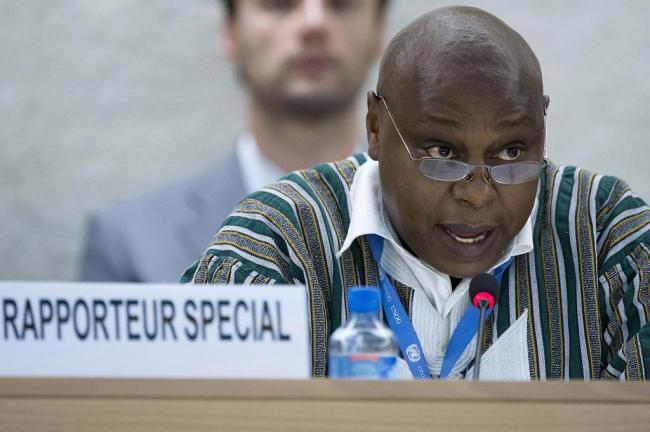
UN expert urges Kazakhstan to boost rights of peaceful assembly, association
Returning from an official visit to Kazakhstan, Maina Kiai, the UN Special Rapporteur on the rights to freedom of peaceful assembly and of association, noted that the Kazakh Government had developed a tendency to focus on restrictions rather than human rights themselves, adding that this had resulted in a situation where rights were treated as privileges to be granted at the discretion of State authorities.
“Although authorities repeatedly make reference to the 'rule of law', the practice in Kazakhstan reflects strong adherence to 'rule by law',” Kiai said in a
press release issued earlier today. “Law is meant to serve people, rather than people serving the law.”
Among the more pressing rights issues facing the country, the UN expert pointed out that the Government's regulation of peaceful assemblies had become increasingly becoming problematic as all peaceful assemblies now required the go-ahead from local authorities and, even then, were limited to specific, government-designated sites.
During Kiai's visit, in fact, a number of individuals from around the country announced their intentions to organize peaceful rallies in eight cities from 24 January to 27 January. Local authorities, however, reportedly rejected the requested locations and some of the individuals were subsequently detained. A few of the peaceful assemblies were eventually permitted but took place in designated areas.
Kiai applauded the Kazakh Government's efforts to maintain cohesion in the country but warned that “maintaining stability” could also be “misused to wrongfully curtail the rights to freedom of peaceful assembly.”
“People who are not allowed to air their grievances peacefully are more likely to air them violently, or find succour in extremist ideologies,” he added. “International human rights law is clear that limitations on this right cannot impair the essence of the right itself. Unfortunately, in Kazakhstan on Wednesday the freedom of assembly is treated as a privilege, or a favour, rather than a right.”
At the same time, while noting that freedom of association is also nominally guaranteed by Kazakhstan's Constitution, Kiai cautioned that “a web of laws and practices” had limited the freedom of political parties, public associations, trade unions, and religious associations, according to the press release.
The political association, Alga!, for instance, was denied registration after seven years of attempts to register as a political party while several public associations have been denied registration based on apparently “flimsy reasons,” such as mistakes in completing applications.
During his nine-day mission, which included visits to Almaty, Aktau, and the capital, Astana, Kiai also visited Zhanaozen, where clashes between police and protesters in 2011 led to the deaths of at least 14 people.
Independent experts or special rapporteurs are appointed by the Geneva-based Human Rights Council to examine and report back on a country situation or a specific human rights theme. The positions are honorary and the experts are not UN staff, nor are they paid for their work.
UN Photo/Jean-Marc Ferré
Support Our Journalism
We cannot do without you.. your contribution supports unbiased journalism
IBNS is not driven by any ism- not wokeism, not racism, not skewed secularism, not hyper right-wing or left liberal ideals, nor by any hardline religious beliefs or hyper nationalism. We want to serve you good old objective news, as they are. We do not judge or preach. We let people decide for themselves. We only try to present factual and well-sourced news.







